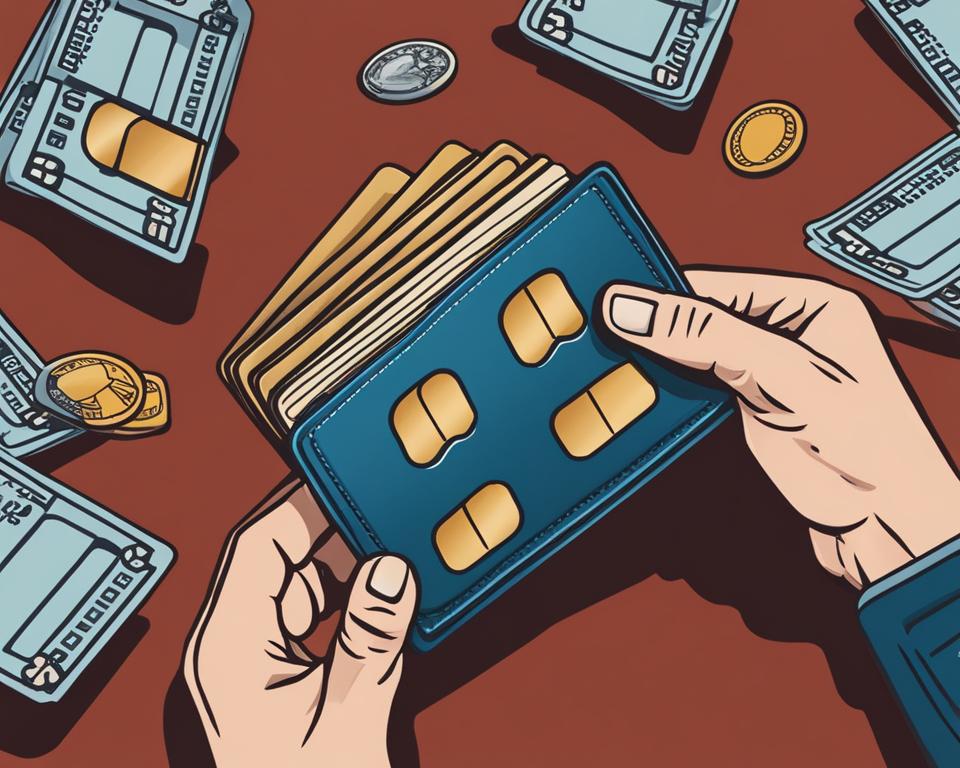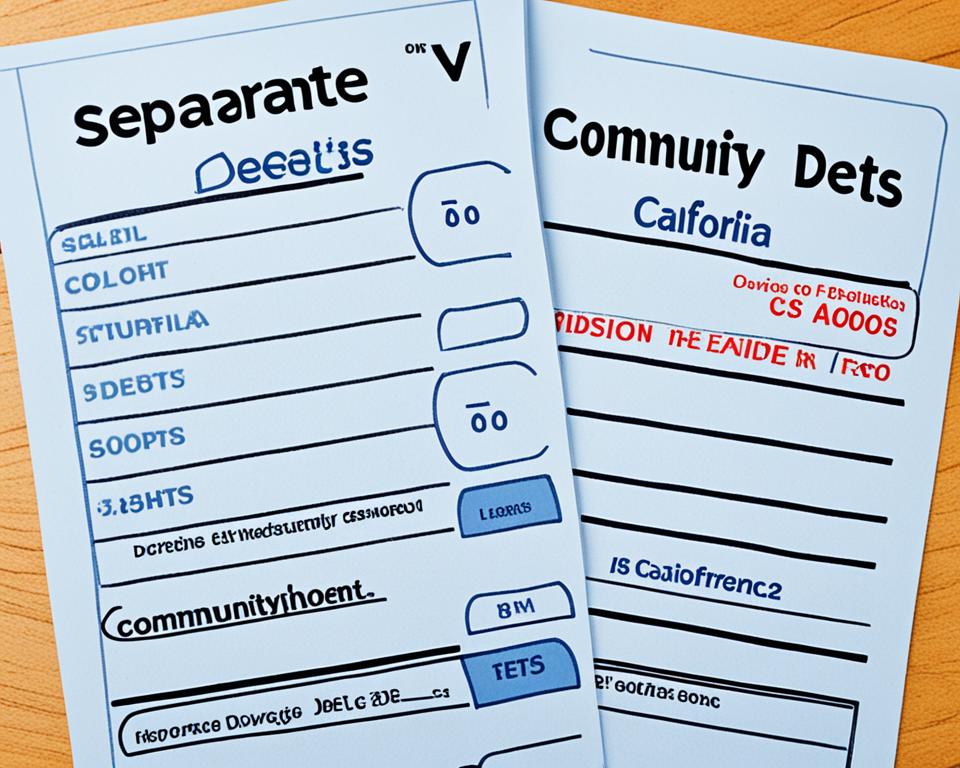Divorce not only has an emotional impact but also affects your financial health. It is essential to protect your credit and finances during and after a divorce. This section provides key tips for managing debt, protecting your credit score, and navigating the financial implications of divorce.
Key Takeaways:
- Managing debt after divorce is crucial for maintaining financial stability.
- Divorce can have an impact on your credit score, so it’s important to take steps to protect it.
- Dividing debt in a divorce settlement requires careful consideration and negotiation.
- Monitoring your credit report post-divorce helps ensure accuracy and identify any discrepancies.
- Working towards rebuilding credit post-divorce is essential for a fresh financial start.
Create a Realistic Budget
After a divorce, it’s crucial to create a realistic budget that takes into account your reduced household income and helps you manage your expenses effectively. This is an important step towards financial stability post-divorce. Prioritize essential expenses like housing, food, and transportation, ensuring that you have a clear understanding of your financial obligations as outlined in your divorce agreement.
Reassessing your family’s needs is essential during this time of transition. Take the opportunity to evaluate your expenses and identify areas where you can make adjustments or let go of unnecessary costs. By focusing on your family’s essential needs and cutting back on non-essential expenses, you can align your budget with your new financial circumstances.
To ensure effective financial management post-divorce, it’s important to track your expenses diligently and make adjustments when necessary. Regularly review your budget to ensure it remains realistic and in line with your financial goals. By staying proactive and mindful of your spending, you can maintain financial stability and work towards rebuilding your financial life.
Example Budget
Here is an example of a budget template that you can use as a starting point for managing your expenses after a divorce:
| Expense Category | Monthly Amount |
|---|---|
| Housing (Rent/Mortgage) | $1,200 |
| Utilities | $200 |
| Food | $400 |
| Transportation | $300 |
| Insurance | $150 |
| Child Support | $500 |
| Alimony | $300 |
| Debt Payments | $200 |
| Healthcare | $150 |
| Entertainment | $100 |
| Savings | $200 |
| Total | $3,700 |
This is a simplified example, and your expenses may vary. It’s essential to personalize the budget based on your specific situation. By reviewing and adjusting your budget regularly, you can ensure that your income covers your expenses and work towards your financial goals.
Reassessing Your Budget
Remember to reassess your budget periodically, especially when there are significant changes to your financial situation or lifestyle. This could include changes in income, housing, or family circumstances. Adjusting your budget as needed will help you maintain effective financial management and adapt to new circumstances.
Creating and sticking to a realistic budget is a critical step in managing your finances after divorce. It allows you to prioritize your expenses, stay within your means, and work towards your financial goals. By reassessing your family’s needs and making necessary adjustments, you can navigate the post-divorce financial landscape with confidence.
Assess Your Obligations
When going through a divorce, it’s important to assess your joint credit cards and credit accounts with your spouse. By understanding and managing these obligations, you can protect your financial well-being. Here are key steps to take:
- Identify all joint credit cards and credit accounts. Make a list of these accounts to have a clear picture of your financial responsibilities.
- Obtain a copy of your credit report. It will provide a comprehensive overview of your credit accounts, both individual and joint, as well as any forgotten credit accounts that might exist. This will allow you to address them and avoid any surprises.
- Close all joint accounts by the end of the divorce process. This will help prevent any further financial entanglements and protect your credit.
- Remove your spouse as an authorized user on your credit cards. This will ensure that they no longer have access to your credit and reduce the risk of unauthorized charges.
- Monitor your credit report closely during and after the divorce. Regularly check for any unauthorized charges or negative information and take action immediately if you identify any discrepancies.
By following these steps, you can effectively manage your joint credit obligations, minimize financial risks, and protect your credit score.
Case Study: Joint Credit Cards
Let’s take a look at a case study to illustrate the importance of assessing and managing joint credit cards during a divorce:
Emma and Michael were going through a divorce. They had three joint credit cards that they had used throughout their marriage. Emma was concerned about her financial future and wanted to ensure that she was not held responsible for any debt accumulated by Michael after their separation.
Emma obtained her credit report and discovered that there were two forgotten joint credit accounts that they had opened a few years ago. This made her realize the significance of assessing and addressing these accounts.
She and Michael agreed to close all joint accounts and remove each other as authorized users. By taking these steps, Emma was able to protect her credit during the divorce process and move towards financial independence.
Remember, by being proactive and taking control of your joint credit obligations, you can safeguard your financial stability and ensure a smoother transition post-divorce.
Determine How to Pay Joint Debts
When going through a divorce, it is crucial to address the joint debts you have with your spouse. Handling these debts correctly can help ensure your financial stability in the future. In this section, we will explore various strategies to determine how to pay off joint debts and secure your financial well-being.
Refinancing or Selling the House
If you and your spouse have a joint mortgage, one of the primary concerns is what to do with the house. You have a few options: refinancing the mortgage or selling the house.
If one spouse will keep the house: Consider refinancing the joint mortgage. This process involves replacing the existing mortgage with a new one in the name of the spouse who will keep the property. Refinancing allows that spouse to assume full responsibility for the mortgage payments and removes the other spouse’s liability.
If you both decide to sell the house: Selling the house is another viable option. By selling the property and dividing the profits according to your divorce settlement, you can eliminate the joint mortgage altogether. This can provide a fresh start for both parties involved.
Paying Off Credit Cards
In addition to the joint mortgage, it’s essential to address any credit card debts accumulated during the marriage. Paying off these debts can help alleviate financial burdens and establish individual financial independence.
If feasible: Consider paying off credit card debts before finalizing the divorce. This allows both parties to start anew without the burden of shared credit card obligations. Paying off these debts may require careful financial planning and budgeting, but it can set the stage for a stronger financial future.
Transferring Debts to Individual Accounts
In cases where there are insufficient assets to pay off all joint debts, you and your attorney can discuss how to allocate the debts and minimize the financial impact.
One possible strategy: Transfer each person’s portion of the debt to individual credit accounts. By doing this, you can separate your financial responsibilities, protect your credit scores, and focus on rebuilding your individual financial health.
It’s crucial to remember that each divorce case is unique, and the best approach for paying off joint debts may vary. Seeking guidance from a trusted attorney and financial advisor can help you navigate this process effectively.
| Joint Debts Strategy | How it Works |
|---|---|
| Refinancing or Selling the House | – Refinancing the joint mortgage allows one spouse to assume full responsibility for the mortgage payments and removes the other spouse’s liability. – Selling the house eliminates the joint mortgage altogether, providing a fresh start for both parties. |
| Paying Off Credit Cards | By paying off credit card debts, both parties can start anew without the burden of shared credit card obligations. |
| Transferring Debts to Individual Accounts | Transferring each person’s portion of the debt to individual credit accounts can separate financial responsibilities and protect credit scores. |
By carefully considering your options and working towards an equitable resolution of joint debts, you can pave the way for a more stable financial future after divorce.

Divorce and Your Credit Score
In the midst of a divorce, it’s important to consider the impact it can have on your credit score. Failing to handle debt properly during this time can result in negative consequences that may persist long after the divorce is finalized. Understanding the credit score impact of divorce and taking appropriate steps to protect your credit is crucial for your financial well-being.
One factor that can affect your credit score is late payments on joint accounts. If bills are missed or paid late during the divorce process, it can result in a drop in your credit score. It’s essential to stay on top of your financial obligations and make timely payments to avoid this negative impact.
Additionally, high credit utilization on joint accounts can also harm your credit score. Credit utilization refers to the percentage of your available credit that you’re currently using. If joint accounts have high balances that exceed the recommended credit utilization ratio of 30%, it can signal to creditors that you may be overextended financially, leading to a lower credit score.
To ensure that your credit score remains intact during and after divorce, it’s crucial to monitor your credit report regularly. This allows you to identify any discrepancies or errors that may arise as a result of the divorce process. By addressing these issues promptly, you can avoid potential damage to your credit score.
Table: Factors That Impact Your Credit Score
| Factor | Description |
|---|---|
| Payment History | Includes on-time payments, late payments, or missed payments. |
| Credit Utilization | The amount of credit you’re using compared to your total available credit. |
| Length of Credit History | How long you’ve had credit accounts and your average account age. |
| New Credit | Inquiries and new credit accounts opened recently. |
| Credit Mix | The types of credit accounts you have (e.g., revolving, installment). |
After a divorce, it’s crucial to rebuild your credit by establishing and managing individual credit accounts. By making timely payments and maintaining a responsible credit utilization ratio, you can gradually rebuild your credit score over time.
Community Debts in California
In California, a community property state, the division of debts acquired during the marriage is of utmost importance in a divorce. These debts, known as community debts, are considered jointly owned by both spouses. It is crucial to address the division of community debts as part of the divorce settlement to protect your credit and financial well-being.
When it comes to dividing community debts in a California divorce, assign clear responsibilities for repayment to safeguard your credit. This ensures that both parties are aware of their obligations and can manage their financial obligations accordingly.
Dividing community debts fairly and efficiently is vital to protect your credit score and financial stability during and after the divorce process.
By clearly defining the division of community debts in the divorce settlement, you can protect yourself from unexpected financial consequences and potential disputes in the future.
Example of Dividing Community Debts
| Debt | Original Amount | Responsible Party |
|---|---|---|
| Credit Card A | $5,000 | Spouse A |
| Credit Card B | $3,000 | Spouse B |
| Personal Loan | $10,000 | Shared Responsibility |
By clearly outlining the debts and assigning responsibility for repayment, both parties can move forward independently and protect their credit during and after the California divorce.

Remember, seeking professional guidance from a qualified divorce attorney or financial advisor can help you navigate the complexities of dividing community debts in California and protect your credit during this challenging time.
Joint Accounts and Credit During Divorce
When going through a divorce, it is crucial to manage joint accounts effectively to protect your credit. Failure to do so can have negative impacts on your financial stability. In this section, we will discuss important steps you can take to navigate joint accounts and credit during the divorce process.
Pay Bills on Time
One of the key considerations when managing joint accounts during a divorce is ensuring that all bills are paid on time. Late payments can harm your credit score and create unnecessary financial stress. Establish a system to monitor and pay your bills promptly, even if the responsibility was previously shared with your ex-spouse. By staying current on payments, you can protect your credit and minimize any potential disputes regarding payment responsibility.
Closing Joint Accounts
Closing joint accounts is another essential step to protect your credit during divorce. Closing these accounts can prevent future charges and limit liability. Start by identifying all joint bank accounts and credit cards and then work with your ex-spouse to close them. If there is no agreement or cooperation, contact your financial institution or credit card provider directly to request the closure.
Freezing Joint Credit Accounts
In some cases, you may not be able to close joint credit accounts immediately. In such situations, freezing these accounts is an effective strategy. Freezing prevents any further charges from being made and limits your liability. Contact your credit card provider and request a freeze on the joint accounts until further notice. This step can help ensure that no unauthorized charges are made while you navigate the divorce process.
Limiting Joint Account Liability
Limiting joint account liability is crucial to protect yourself from financial entanglements during and after divorce. Once joint accounts are closed or frozen, you should strive to limit your liability for any outstanding debts. This may involve working with an attorney to negotiate a fair division of the debts or seeking legal advice on how to separate your financial responsibilities from those of your ex-spouse. Taking the necessary steps to limit joint account liability can help safeguard your credit and financial well-being.
By effectively managing joint accounts during a divorce, you can protect your credit and minimize potential financial challenges. Paying bills on time, closing joint accounts, freezing credit accounts, and limiting liability are essential steps towards maintaining financial stability.
| Key Actions | Benefits |
|---|---|
| Pay bills on time | Protects your credit score and minimizes disputes over payment responsibility. |
| Close joint accounts | Prevents future charges and limits liability. |
| Freeze joint credit accounts | Prevents unauthorized charges and limits liability during the divorce process. |
| Limit joint account liability | Minimizes financial entanglements and safeguards your credit and financial well-being. |
Establishing Individual Credit
After a divorce, individuals often find themselves without credit established in their own name. This can pose challenges when applying for loans, renting a new home, or even getting a credit card. However, there are steps you can take to build your credit independently and establish a positive credit history.
One of the first steps is to request a copy of your credit report to assess any outstanding debts. This will give you a clear understanding of your financial obligations and help you plan your credit-building strategy. You can request a free copy of your credit report from each of the three major credit bureaus – Equifax, Experian, and TransUnion – once a year.
Consider applying for a credit card in your own name to start building or rebuilding your credit. Look for credit cards specifically designed for individuals with limited or no credit history. These cards usually have lower credit limits and may require a security deposit. Use the card responsibly by making regular payments and keeping your credit utilization low to establish a positive credit history.
| Benefits of Establishing Individual Credit | Tips for Building Credit |
|---|---|
|
|
“Building credit after a divorce can be challenging, but it’s not impossible. By taking proactive steps to establish individual credit, you can regain financial independence and access new opportunities.” – Financial Advisor
Remember to use your new credit card responsibly and avoid accumulating excessive debt. Making on-time payments and keeping your balances low will help you build a positive credit history over time. Additionally, consider seeking guidance from a credit counselor who can provide personalized advice and strategies to boost your credit score.
Establishing individual credit after a divorce is an essential step in rebuilding your financial life. By creating a solid credit foundation, you can achieve greater financial stability and pursue your future goals with confidence.

Managing a Mortgage After Divorce
If you and your ex-spouse have a joint mortgage, it’s important to understand the financial implications and responsibilities associated with this type of loan. Despite the divorce, both parties remain liable for the mortgage, and it will continue to appear on both credit reports.
To remove one spouse from the mortgage, several options can be considered:
- Refinancing the mortgage: This involves obtaining a new loan in one spouse’s name only, paying off the existing joint mortgage in the process.
- Selling the property: If selling the house is a viable option, the proceeds from the sale can be used to pay off the existing mortgage and separate both parties’ financial obligations.
- Paying off the loan: If financial circumstances permit, one spouse can choose to pay off the mortgage entirely, releasing both parties from the loan and any associated responsibilities.
It’s crucial to carefully consider the long-term financial implications of retaining a joint mortgage. Continuing to share this financial commitment can impact your ability to obtain new credit or apply for additional loans in the future. Additionally, missed or late payments on the joint mortgage can negatively affect both parties’ credit scores.
It’s recommended to consult with a financial advisor or mortgage specialist who can provide personalized guidance based on your specific situation.
Pros and Cons of Managing a Joint Mortgage After Divorce
| Pros | Cons |
|---|---|
| Opportunity to retain property | Limited financial flexibility |
| Shared equity in the property | Potential impact on credit scores |
| Possible tax benefits | Continued financial ties with ex-spouse |
By examining the pros and cons of managing a joint mortgage after divorce, you can make an informed decision that aligns with your long-term financial goals.
Rebuilding Credit Independently
For individuals whose credit was tied to their spouse during marriage, rebuilding or establishing credit independently can be a challenge. However, with the right strategies and financial discipline, it is possible to rebuild your credit and regain financial stability after divorce.
One effective way to start rebuilding credit after divorce is by applying for a secured credit card. Secured credit cards require a cash deposit as collateral, making them an ideal option for individuals with low or no credit. Use the secured credit card responsibly by making small purchases and paying off the balance in full each month. This positive payment history will help demonstrate your creditworthiness and improve your credit score over time.
Starting small to build credit is a smart approach. By managing a secured credit card wisely and consistently, you can establish a positive credit history and eventually qualify for traditional credit cards.
In addition to using a secured credit card, consider seeking credit counseling if needed. Credit counseling agencies can provide guidance on managing debts, creating a budget, and improving your financial literacy. They can also negotiate with creditors to develop repayment plans or reduce interest rates, helping you regain control of your finances.
Benefits of Rebuilding Credit Independently:
- Increases your financial independence.
- Allows you to qualify for better credit options in the future.
- Helps you regain control of your finances after divorce.
- Opens up opportunities for lower interest rates on loans and credit cards.
Remember, rebuilding credit takes time and persistence. It’s important to stay committed to responsible financial habits, such as paying bills on time and keeping credit card balances low. With patience and consistency, you can gradually improve your credit standing and achieve financial stability after divorce.
Monitoring and Protecting Your Credit
After a divorce, it’s crucial to proactively monitor and protect your credit to ensure its accuracy and safeguard against any unauthorized activities. By staying vigilant and taking the necessary steps, you can maintain a strong credit profile even during this challenging time.
Regularly Check Your Credit Reports
One of the first steps in monitoring your credit after divorce is to regularly check your credit reports. This allows you to verify that joint accounts have been closed and to identify any discrepancies or unauthorized activities. By reviewing your credit reports, you can address any issues promptly and minimize the potential impact on your credit score.
“Regularly check your credit reports to verify that joint accounts have been closed and that there are no unauthorized activities.”
Identify and Address Discrepancies
During and after divorce, it’s essential to be proactive in identifying any discrepancies on your credit reports. This could include unfamiliar accounts, incorrect information, or fraudulent activities. If you notice any discrepancies, reach out to the credit bureaus to dispute the inaccurate information and have it rectified as soon as possible.
Protect Your Credit During Divorce
Divorce can be a challenging and emotionally charged time, but it’s important to prioritize the protection of your credit. Take proactive steps such as closing joint accounts, removing authorized users, and freezing any joint credit accounts. By doing so, you can minimize the risk of incurring further debt or financial liabilities during the divorce process.
Financial Independence After Divorce
Achieving financial stability and independence after a divorce requires careful financial management and planning. By taking proactive steps to protect your credit, manage debts, and create a plan for the future, you can minimize risks and rebuild your financial life.
Protecting Your Credit
One of the first steps towards financial independence after divorce is to protect your credit. Close joint accounts and remove your ex-spouse as an authorized user on your credit cards. Monitor your credit report regularly to ensure there are no unauthorized charges or discrepancies. By maintaining a good credit standing, you’ll have better access to financial opportunities in the future.
Managing Debts
Navigating your financial future means effectively managing any debts that may have accumulated during your marriage. Assess your outstanding debts and create a plan to pay them off or allocate them appropriately. Consider seeking guidance from a financial advisor or credit counselor to help you develop a repayment strategy that fits your financial situation.
Creating a Financial Plan
Rebuilding your financial life requires careful planning. Create a realistic budget that aligns with your post-divorce income and expenses. Identify your financial goals and prioritize them accordingly. Whether it’s saving for retirement, buying a new home, or starting a business, having a clear financial plan will provide you with guidance and help you stay on track.
Minimizing Risks
Minimizing risks is essential for maintaining financial stability after divorce. Consider obtaining insurance coverage, such as life insurance or disability insurance, to protect yourself and your family against unexpected events. Build an emergency fund to cover any unforeseen expenses and provide a safety net in case of financial hardships.
Rebuilding Your Financial Life
Rebuilding your financial life after divorce requires time and effort, but it is possible. Stay committed to your financial goals and make wise financial decisions. Take advantage of educational resources, workshops, and seminars that can help you improve your financial literacy and empower you to make informed decisions about your money.
Remember, everyone’s financial situation is unique, so it’s essential to seek professional advice that aligns with your needs. By taking control of your finances, protecting your credit, and planning for the future, you can achieve the financial independence you deserve.

| Steps to Achieve Financial Independence After Divorce | Benefits |
|---|---|
| Protect your credit | Ensure better access to financial opportunities and favorable interest rates |
| Manage debts effectively | Reduce financial stress and improve your financial health |
| Create a financial plan | Stay organized and focused on your financial goals |
| Minimize risks | Protect yourself and your family against unexpected financial burdens |
| Rebuild your financial life | Gain confidence and take control of your financial future |
Conclusion
Divorce can have significant financial implications for individuals, but by taking the right steps, you can protect your credit and finances during and after the divorce process. One crucial consideration is creating a realistic budget based on your reduced household income. By prioritizing essential expenses and reassessing your family’s needs, you can effectively manage your finances and maintain stability during this transitional period.
Assessing your obligations is equally important. Identify all joint credit cards and accounts you have with your spouse and obtain a copy of your credit report to ensure a comprehensive overview. Closing joint accounts before the divorce is finalized can prevent further financial entanglements and protect your credit score. Additionally, monitoring your credit report closely will help you detect any unauthorized charges or negative information.
Managing joint debts is another key aspect. If possible, aim to eliminate all joint financial obligations during the divorce process. Consider refinancing a joint mortgage, selling the house, or paying off credit card debts for a fresh start. If there are insufficient assets to cover all debts, seek guidance from your attorney on how to allocate and transfer debts to individual credit accounts.
Building or rebuilding your credit post-divorce is crucial for your long-term financial well-being. Establishing individual credit can be challenging, but it’s essential. Request a copy of your credit report, apply for a credit card in your name, and make timely payments to establish a positive credit history. By taking proactive steps and seeking professional guidance, you can navigate the financial challenges of divorce and work towards a stable financial future.
FAQ
What should I consider when managing my finances after a divorce?
After a divorce, it’s important to create a realistic budget based on your reduced household income. Prioritize essential expenses and let go of unnecessary ones to prioritize financial stability.
How can I protect my credit during a divorce?
Identify all joint credit cards and accounts you have with your spouse, obtain a copy of your credit report, close joint accounts, and remove your spouse as an authorized user on your credit cards. Monitor your credit report closely for any unauthorized charges or negative information.
How should I handle joint debts during a divorce?
If possible, try to eliminate all joint financial obligations during the divorce process. Consider refinancing a joint mortgage or selling the house to divide the profits. Pay off credit card debts if feasible or discuss with your attorney how to allocate the debts and transfer each person’s portion to individual credit accounts.
Can divorce affect my credit score?
Yes, divorce can potentially impact your credit score if joint debts are not handled properly. Late payments and high credit utilization on joint accounts can negatively affect your credit. It’s important to monitor your credit report, address any discrepancies, and rebuild your credit by making timely payments and responsibly managing your individual credit accounts.
How are community debts divided in California?
In California, which is a community property state, debts incurred during the marriage generally belong to both spouses equally. It is crucial to address the division of community debts as part of the divorce settlement to protect your credit. Allocating responsibilities for repayment is essential to safeguard your financial well-being.
What should I do with joint accounts and credit during a divorce?
It’s crucial to manage joint accounts carefully to protect your credit. Pay all joint bank accounts on time, close joint accounts whenever possible, or freeze them to prevent further charges. Limiting joint account liability is important to avoid financial entanglements during and after the divorce process.
How can I establish credit in my own name after a divorce?
After a divorce, if you have no credit established in your own name, request a copy of your credit report to assess your debts. Consider applying for a credit card in your own name to start building or rebuilding your credit. Ensure you make regular payments to establish a positive credit history.
What should I do about a joint mortgage after a divorce?
If you and your ex-spouse have a joint mortgage, both of you are still liable for the loan even after divorce. The joint mortgage will continue to appear on both credit reports. To remove one spouse from the mortgage, refinancing, selling the property, or paying off the loan may be necessary. It’s important to consider the long-term financial implications of retaining a joint mortgage.
How can I rebuild my credit independently after a divorce?
If your credit was tied to your spouse during marriage, rebuilding or establishing credit independently can be a challenge. Start by applying for a secured credit card or a small credit limit card to begin rebuilding your credit. Maintain a positive payment history and consider credit counseling if needed. Gradually, you can improve your credit standing and qualify for more credit options.
How should I monitor and protect my credit after a divorce?
Monitor your credit closely after divorce to ensure accuracy and detect any discrepancies. Regularly check your credit reports to verify that joint accounts have been closed and that there are no unauthorized activities. Take proactive steps to protect your credit during divorce and address any issues promptly.
How can I achieve financial independence after a divorce?
Achieving financial independence after divorce requires careful financial management. By protecting your credit, managing debts, and creating a plan for the future, you can minimize risks and work towards a stable financial future. Rebuilding your financial life will take time and effort, but with the right steps, you can overcome the challenges of divorce.





